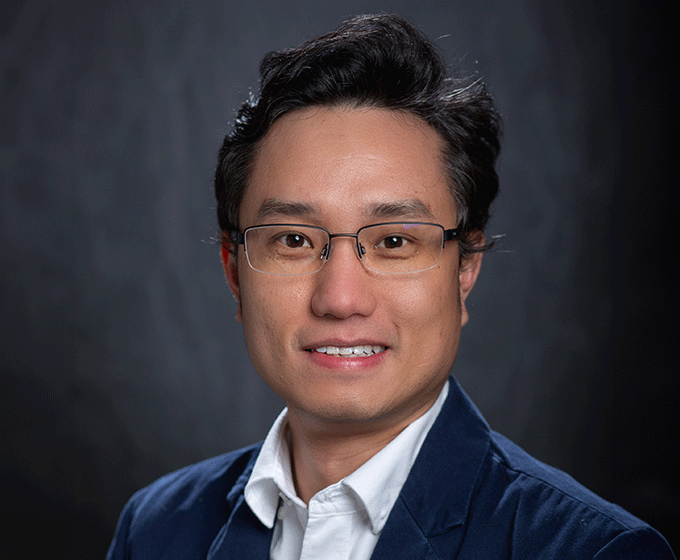
UTSA's Luan Vu will lead a three-year project investigating the long-term severity of respiratory health in infants who contract RSV.
SEPTEMBER 23, 2024 — The Parker B. Francis Fellowship program, which is dedicated to advancing research in pulmonary biology and respiratory disease, has named Luan Vu, assistant professor of Molecular Microbiology and Immunology (MMI), a 2024 Parker B. Francis Fellow. As a 2024 fellow, Vu will serve as the lead principal investigator on a three-year project that will receive a total of $225,000 in funding from the fellowship program. The project will investigate the long-term severity of respiratory health in infants who contract Respiratory Syncytial Virus (RSV) and identify potential therapeutics that could improve pediatric health outcomes.
According to the Centers for Disease Control and Prevention (CDC), RSV leads to approximately 58,000 to 80,000 hospitalizations in children under five years of age annually in the United States.
Vu joined UTSA as an assistant professor in the College of Sciences’ Department of MMI on August 1, 2024. His project with the Parker B. Francis Fellowship program is entitled, “Deciphering Mechanism(s) of KLRG1+ILC2s Mediating RSV Severity in Infants.”
Through the project, Vu aims to understand how RSV, a common infant lung infection, influences long-term respiratory health. Vu and his team hope to discover new therapies that could stop the progression of chronic respiratory diseases and improve children’s health.
Vu will study the molecular and cellular mechanisms of RSV immunopathogenesis and will utilize advanced lab techniques to investigate the role of a particular immune cell in infant RSV infections and their long-term impact on respiratory health. His previous research revealed the critical role of innate lymphoid cells (ILC2s) in exacerbating RSV severity, and he hopes to uncover how these immune cells influence long-term respiratory health.
“My interest in this research study stems from my deep-seated commitment to understanding the complexities of infant respiratory diseases, particularly those caused by RSV,” Vu said. “This research is crucial for uncovering the mechanisms by which RSV infections in infancy lead to long-term respiratory complications.”
Vu will collaborate with UTSA faculty who will contribute their expertise in bioinformatics and data analysis. Additionally, Vu will work with UTSA students who will assist with sample collection, laboratory experiments and data processing. The project will provide students with career development opportunities in pulmonary immunology and respiratory disease research.
Artificial intelligence (AI) will also play a significant role in advancing this project. Vu and his team will utilize AI-driven bioinformatics tools to analyze large datasets to identify patterns and correlations that may not be apparent through traditional methods. This approach will enhance their understanding of the complex interactions between RSV infection and immune responses in infants.
“This project aligns with my broader goal of developing targeted therapies to improve respiratory outcomes in vulnerable populations,” Vu said. “By studying these cells, we aim to decipher how early-life RSV infections might set the stage for more severe lung conditions later in life. The insights gained could forge new therapeutic strategies, reducing the risk of chronic respiratory diseases stemming from severe infantile RSV infections and bolstering public health.”
He added, “The potential ripple effects promise to alleviate societal and economic impacts of such diseases, safeguarding future generations’ health.”
UTSA Today is produced by University Communications and Marketing, the official news source of The University of Texas at San Antonio. Send your feedback to news@utsa.edu. Keep up-to-date on UTSA news by visiting UTSA Today. Connect with UTSA online at Facebook, Twitter, Youtube and Instagram.
Move In To COLFA is strongly recommended for new students in COLFA. It gives you the chance to learn about the Student Success Center, campus resources and meet new friends!
Academic Classroom: Lecture Hall (MH 2.01.10,) McKinney Humanities BldgWe invite you to join us for Birds Up! Downtown, an exciting welcome back event designed to connect students with the different departments at the Downtown Campus. Students will have the opportunity to learn about some of the departments on campus, gain access to different resources, and collect some giveaways!
Bill Miller PlazaCome and celebrate this year's homecoming at the Downtown Campus with food, games, giveaways, music, and more. We look forward to seeing your Roadrunner Spirit!
Bill Miller PlazaThe University of Texas at San Antonio is dedicated to the advancement of knowledge through research and discovery, teaching and learning, community engagement and public service. As an institution of access and excellence, UTSA embraces multicultural traditions and serves as a center for intellectual and creative resources as well as a catalyst for socioeconomic development and the commercialization of intellectual property - for Texas, the nation and the world.
To be a premier public research university, providing access to educational excellence and preparing citizen leaders for the global environment.
We encourage an environment of dialogue and discovery, where integrity, excellence, respect, collaboration and innovation are fostered.